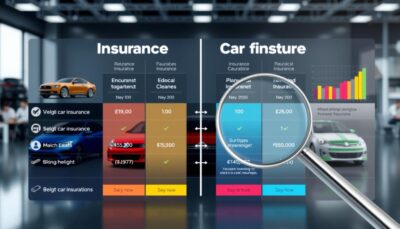Are you paying too much for your car insurance? The insurance world is always changing. It’s key to compare car insurance quotes often to get the best rates. At our site, we help you find affordable coverage that fits your needs.
In this article, we’ll talk about why comparing car insurance quotes best rates is important. We’ll look at what affects your rates and give you tools to find great deals. Whether you’re new to driving or have been for years, our tips will help you save on car insurance.
Key Takeaways
- Comparing car insurance quotes can save you hundreds or even thousands of dollars annually.
- Factors like your age, driving history, and vehicle type can significantly impact your insurance rates.
- Online tools and resources make it easier than ever to gather and compare quotes from multiple insurers.
- Leveraging discounts and maintaining a clean driving record can help you secure the most competitive rates.
- Regularly reviewing your coverage and making adjustments as needed can ensure you’re getting the best value for your money.
Understanding Car Insurance Quotes
Exploring cheap vehicle coverage and economical car protection can seem overwhelming. But, knowing about car insurance quotes best rates is crucial for picking the right policy. Let’s look at what car insurance quotes are, why they differ, and what makes up a quote.
What Are Car Insurance Quotes?
A car insurance quote gives an estimate of policy costs based on your driving habits and coverage needs. Insurers look at your age, driving record, and vehicle type to figure out your risk level. This helps them set your premium.
Why Quotes Vary Among Insurers
Each insurance company has its own way of judging risk and pricing policies. Things like claims history, where you live, and marketing plans can change quotes. It’s important to compare quotes to find the best economical car protection for you.
Key Components of a Quote
- Coverage limits: The maximum the insurer will pay for a covered event.
- Deductibles: The amount you pay before insurance kicks in.
- Premium: The ongoing cost of the policy, paid monthly or annually.
- Discounts: Ways to save, like for safe driving or bundling policies.
Knowing these parts of a car insurance quotes best rates helps you make a smart choice. You can find the most cheap vehicle coverage that meets your budget and needs.
Factors That Affect Car Insurance Rates
Looking for affordable car insurance? Knowing what affects rates is key. Your age, driving experience, vehicle type, and location all matter. These factors can change how much you pay for coverage.
Age and Driving Experience
Younger drivers, especially those under 25, are seen as riskier by insurers. This means they often pay more for insurance. But, drivers with a safe driving record can get lower rates. Insurers see them as less likely to make a claim.
Type of Vehicle
The car you drive affects your insurance costs. Insurers look at the car’s make, model, age, and safety features. High-performance or luxury cars, and those at risk for theft or expensive repairs, cost more to insure.
Choosing a safer, more fuel-efficient car can lead to lower rates. This can help you save money on your insurance.
Location and Zip Code
Your location, as shown by your zip code, greatly influences insurance rates. Crime rates, traffic, and accident frequencies in your area are considered. Drivers in urban or high-risk areas often pay more than those in rural or safer places.
Knowing these factors helps you find the best, most affordable insurance. It ensures your coverage fits your needs and driving habits.
How to Compare Car Insurance Quotes
Comparing car insurance quotes is key to finding the best rates and coverage. Use online tools and gather important information to make a smart choice. Here’s how to compare car insurance quotes best rates effectively.
Online Comparison Tools
The internet makes comparing car insurance quotes easy. Use trusted online sites to enter your details and get quotes from many insurers. These tools save time and help find the best rates.
Key Information to Gather
- Your driving history, including any accidents or violations
- The type, make, model, and year of your vehicle
- Your desired coverage limits and deductibles
- Your zip code and location
- Your age, gender, and marital status
Evaluating Coverage Options
Don’t just look at the price when comparing quotes. Check the coverage details like liability, collision, and comprehensive. Make sure you’re comparing the same things from each insurer.
| Insurance Provider | Car Insurance Quotes Best Rates | Competitive Insurance Rates | Coverage Details |
|---|---|---|---|
| Company A | $1,200 annually | $100 per month | Liability: $50,000/$100,000, Collision: $500 deductible, Comprehensive: $500 deductible |
| Company B | $1,400 annually | $117 per month | Liability: $100,000/$300,000, Collision: $250 deductible, Comprehensive: $250 deductible |
| Company C | $1,300 annually | $108 per month | Liability: $75,000/$150,000, Collision: $500 deductible, Comprehensive: $500 deductible |
By following these steps, you can find the best rates and coverage for your needs. Remember to gather accurate information and compare the same things to make an informed choice.
Tips for Finding the Best Rates
Looking for auto insurance discounts and thrifty vehicle insurance can be easy. There are many ways to find great rates. For example, bundling policies or keeping a clean driving record can save you a lot.
Bundling Policies for Discounts
Lowering your insurance costs is easier when you bundle policies. Many insurers give discounts for insuring multiple vehicles or combining auto with homeowner’s or renter’s insurance. This can save you a lot and make managing your insurance simpler.
Maintaining a Clean Driving Record
Your driving history affects your insurance rates. Insurers see drivers with clean records as safer, which means lower premiums. Stay away from traffic tickets, accidents, and other infractions to show you’re a responsible driver.
Taking Advantage of Discounts
- Look for discounts based on your occupation, education, or membership in certain organizations.
- Consider installing safety features, such as anti-theft devices or dashcams, which may qualify you for additional savings.
- Ask about discounts for good grades if you or a family member are a student.
- Inquire about discounts for completing a defensive driving course or for being a loyal customer with your insurer.
By using these strategies, you can cut down your auto insurance discounts and get better thrifty vehicle insurance coverage. Always check for new discounts and stay updated on what’s available to you.
The Role of Credit Scores in Insurance Rates
Your credit score is key in getting affordable car insurance rates. Insurance companies use your credit score to figure out how risky you are. This can change how much you pay for your competitive insurance rates.
Knowing how credit scores affect your premiums is important. Improving your credit score can help you get the best rates for your car insurance.
How Credit Affects Premiums
Insurance companies think your credit history shows if you’ll file claims. People with lower credit scores are more likely to file claims. So, they pay more for insurance.
On the other hand, those with great credit get lower rates. They’re seen as less risky.
Improving Your Credit Score
- Always pay your bills on time. This is the biggest part of your credit score.
- Keep your credit card balances low. Try to use less than 30% of your credit limit.
- Don’t apply for too many new credit cards. Each application can lower your score.
- Check your credit report often and fix any mistakes.
Checking Your Credit Report
It’s important to check your credit report often. You can get a free report from each of the three big credit bureaus (Experian, Equifax, and TransUnion) every 12 months. Look over your report carefully and fix any wrong information.
Understanding how your credit score affects your affordable car insurance rates is crucial. By improving your credit score, you can get the best competitive insurance rates available.
Types of Car Insurance Coverage
Car insurance can seem overwhelming, but knowing the different types is key. We’ll explore the main parts of car insurance policies. This includes liability insurance, collision and comprehensive coverage, and uninsured/underinsured motorist protection.
Liability Insurance
Liability insurance is the base of any car insurance policy. It covers damages or injuries you cause to others if you’re at fault. It’s often the cheapest option for cheap vehicle coverage and economical car protection.
Collision and Comprehensive Coverage
Comprehensive coverage protect your vehicle. Collision pays for repairs or replacement if your car is damaged in an accident. Comprehensive covers non-collision incidents like theft, vandalism, or natural disasters. These are great for more economical car protection.
Uninsured and Underinsured Motorist Protection
What if the at-fault driver doesn’t have enough insurance? Uninsured and underinsured motorist protection helps cover your costs. It’s a cheap vehicle coverage that offers peace of mind and financial security.
| Coverage Type | What It Covers | Typical Cost |
|---|---|---|
| Liability Insurance | Damage or injuries caused to others in an accident | $500 – $1,500 per year |
| Collision Coverage | Repairs or replacement for your vehicle if involved in an accident | $300 – $1,000 per year |
| Comprehensive Coverage | Damage to your vehicle from non-collision events like theft, vandalism, or natural disasters | $200 – $600 per year |
| Uninsured/Underinsured Motorist Protection | Coverage if you’re involved in an accident with a driver who has insufficient or no insurance | $100 – $500 per year |
Knowing the different car insurance coverage types helps you choose wisely. You can find the cheap vehicle coverage and economical car protection that fits your budget and needs.
The Importance of Reviewing Your Coverage Annually
Car insurance is key for safe driving. It protects you from accidents or unexpected events. But, your insurance needs can change. So, it’s important to check your coverage often. This way, you can find the best car insurance quotes and low-cost auto policies for your life and driving habits.
When to Reassess Your Policy
Experts say to check your car insurance policy yearly. Or, do it when a big life event happens, like:
- Purchasing a new vehicle
- Getting married or divorced
- Moving to a new home or changing your commute
- Adding or removing drivers from your policy
- Reaching a new age or driving experience milestone
Adjusting for Changes in Lifestyle
As your life changes, so should your insurance. By reviewing your policy often, you can tweak your coverage. You might change your limits, deductibles, or even switch insurers. This way, you get the most value for your money.
Staying Updated with Market Rates
The car insurance market keeps evolving. Insurers introduce new discounts, options, and prices. By keeping up with these changes, you can find the best car insurance quotes and low-cost auto policies during your annual review.
Being proactive and thorough in your research is crucial. By reviewing your policy yearly, you ensure you’re protected at the best price.
Common Mistakes to Avoid When Shopping for Insurance
Finding the right car insurance can be tough. But, by avoiding common mistakes, you can get good coverage without spending too much. We’ll look at the main errors to dodge when picking your car insurance policy.
Ignoring Policy Details
Many people miss the fine print in insurance policies. It’s key to check the coverage limits, deductibles, and what’s not covered. This way, you know what your plan includes. Not doing this can cause problems when you need to file a claim.
Failing to Ask Questions
It’s okay to ask your insurance company questions. They can help clear up any doubts about your coverage. Asking the right questions can help you avoid making big mistakes.
Relying Solely on Price
Price is important, but it shouldn’t be the only thing you look at. Going for the cheapest option might mean you get less coverage. It’s better to find a balance between cost and good protection.
By avoiding these mistakes and looking at your insurance needs fully, you can find the right coverage. Remember, a bit of effort now can save you a lot of trouble later.
How to Use Discounts to Your Advantage
Savvy car owners know that finding affordable auto insurance rates starts with maximizing discounts. By understanding the different discounts and who can get them, you can save a lot. This helps lower your insurance costs.
Types of Discounts Offered
Insurance companies offer many discounts to fit different customers. Some common ones include:
- Safe driver discounts for those with clean driving records
- Bundling discounts for policyholders who insure multiple vehicles or combine home and auto policies
- Good student discounts for young drivers maintaining high academic performance
- Occupational discounts for certain professions, such as military personnel or teachers
- Loyalty discounts for customers who have been with the same insurer for an extended period
Eligibility Criteria for Discounts
To get these discounts, you must meet certain requirements. This might involve showing proof of your driving history, grades, or job. Always check the insurer’s rules and provide the needed documents to save more.
Tracking Your Savings
After getting discounts, keep an eye on your savings. Check your policy and bills often to make sure you’re getting the discounts. If your rates change or you notice any issues, reach out to your insurer for help.
By knowing about auto insurance discounts and how to get them, and by keeping track of your savings, you can get the best deal on affordable car insurance. This way, you can save a lot on your vehicle coverage.
The Impact of Claims on Insurance Rates
Your claim history greatly affects your competitive insurance rates and budget-friendly premiums. It’s key to understand how claims impact your costs. This knowledge helps drivers save money on their insurance.
How Filing a Claim Affects Premiums
Filing a claim can raise your premiums. Insurers see claims as a sign of higher risk. The increase depends on the claim’s severity, coverage type, and your driving record.
Drivers with many claims face bigger rate hikes. Those with fewer claims see smaller increases.
When to File a Claim
- File a claim if repair costs are more than your deductible. The insurer will cover the rest.
- For minor damages below your deductible, paying yourself might be cheaper. This avoids a premium hike.
- Talking to your insurer can guide you. They’ll consider your situation and coverage to decide the best action.
Understanding Claim History
Keeping a clean claims history is vital for competitive insurance rates and budget-friendly premiums. Insurers watch your claim history closely. It affects your eligibility for discounts and policy costs.
By understanding claim impacts and taking steps to reduce them, you can manage your insurance costs better.
“The fewer claims you file, the better your chances of keeping your insurance rates low and manageable.”
Customer Service and Insurer Reputation
When looking for the best car insurance quotes, think about the customer service and reputation of the insurer. Your happiness with the policy matters a lot. Let’s look at how to check insurer reviews, the importance of claims satisfaction, and the value of what others say.
Researching Insurer Reviews
Take time to read online reviews and ratings of car insurance providers. Look for unbiased third-party sources that check things like claims processing and customer experience. This can help you understand how the insurer treats its customers and handles their needs.
Importance of Claims Satisfaction
When comparing car insurance quotes best rates, focus on the insurer’s claims satisfaction ratings. A good insurance policy is one that can help when you need to file a claim. High claims satisfaction means the insurer is quick, clear, and dedicated to solving problems fast.
Recommendations from Peers
Ask your friends, family, and coworkers who have car insurance for their opinions. They can share their experiences with economical car protection. Their advice can be very helpful in making a good choice.
By looking at the insurer’s reputation, claims satisfaction, and what others say, you can find the best car insurance quotes best rates. You’ll also get great service to keep your car safe and your mind at ease.
Final Steps in Choosing the Right Car Insurance
Choosing the right car insurance is key to protecting your vehicle and money. As you get close to making your choice, it’s important to review the policy terms. Make sure your coverage limits are right and sign up with confidence.
Rereading Your Policy Terms
Before you buy your car insurance, read the policy terms carefully. Make sure you know what’s covered, including deductibles and any limits. This helps you avoid surprises and ensures the policy fits your needs for affordable and competitive rates.
Confirming Your Coverage Limits
Check the coverage limits in your policy, like liability and collision. Make sure they meet your state’s rules and give you the protection you want. Changing these limits now can prevent unexpected costs if you’re in an accident.
Signing Up for Your Policy
After you’re happy with the policy and coverage, it’s time to sign up. You might need to give more info, choose a payment plan, and finalize your enrollment. Our team is ready to help you through this step, making the transition smooth.
FAQ
What are car insurance quotes?
Car insurance quotes are estimates from insurance companies. They show how much you’ll pay for coverage based on your driver and vehicle details. These quotes consider many factors to give you a premium price.
Why do car insurance quotes vary among insurers?
Quotes differ because insurers assess risk differently. They use various methods and strategies. Your driving history, vehicle, and location also play a role in the rates.
What are the key components of a car insurance quote?
A quote includes the premium, coverage limits, and deductibles. The premium is what you pay. Coverage limits are the maximum amounts the insurer pays for claims. Deductibles are what you pay before insurance kicks in.
What factors affect car insurance rates?
Rates are influenced by your age, driving experience, and vehicle type. Your location, credit score, and driving history also matter. These factors help insurers set your rates.
How can I effectively compare car insurance quotes?
Use online tools to compare quotes. Gather information about your vehicle and driving. Look at coverage options to compare them fairly.
What tips can help me find the best car insurance rates?
To find the best rates, consider bundling policies and keeping a clean driving record. Take advantage of discounts and review your coverage regularly. This helps you get competitive rates.
How do credit scores impact car insurance rates?
Credit scores affect your rates. Improving your score can lower premiums. Poor credit may increase them. Check your credit report often.
What are the main types of car insurance coverage?
Main coverage types include liability, collision, comprehensive, and uninsured/underinsured motorist protection. Knowing these can help you choose the right coverage for you.
Why is it important to review my car insurance coverage annually?
Reviewing coverage annually ensures it fits your needs. It also helps you get the best rates. Adjust your coverage as your lifestyle or vehicle changes.
What common mistakes should I avoid when shopping for car insurance?
Don’t ignore policy details or rely only on price. Understand the coverage you’re getting. Consider more than just the premium cost.
How can I use discounts to my advantage when getting car insurance?
Use discounts to lower costs. Look for different discounts and understand their criteria. Track the savings you get from discounts.
How do claims affect my car insurance rates?
Claims can raise your rates. Insurers see you as higher-risk. Think carefully before filing a claim or paying out-of-pocket.
Why is customer service and insurer reputation important when choosing car insurance?
Good customer service and a strong reputation matter. They affect your claims experience. Research reviews and ask for recommendations to find a reliable provider.
What are the final steps in choosing the right car insurance policy?
Review policy terms and confirm coverage limits. Make sure you’re comfortable with the details before signing up. This ensures you understand your coverage fully.







